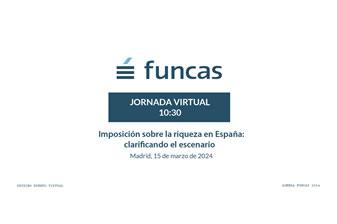Public economy and taxation
Two lines of research are contemplated under this section: on the one hand Taxation and on the other, the Public Economy and Well-being.
Funcas’studies on Taxation are aimed at rigorous analysis and its impact on the economic environment in general, paying special attention to the Spanish tax reality. To achieve this, the unit develops and enhances the study, both theoretical and applied, of tax issues and their impact on economic reality. In this sense, it is a platform from where quick answers to the questions that are usually asked in the study of tax reforms, present or future – tax impact, distributive effects, efficiency costs, social welfare – are offered, with agility and rigor. On the other hand, it also offers comparative analyzes of the Spanish economic reality with respect tosurrounding countries in order to identify weaknesses, inefficiencies and proposals for improvement.
The research on Public Expenditure, Economic Regulation and Well-being aims to promote and develop the analysis of public sector intervention in market economies, with special attention to the set of actions that make up the social welfare system, taking as a main reference the Spanish and European reality. The work program therefore includes aspects related to the regulation of markets, the finances of public administrations and, in particular, the examination of the objectives and instruments of social policy, their consequences on economic growth and social cohesion, and the relations between the public, private and non-profit sectors.
Highlighted
Artículo
Spain’s budget: Challenges for 2024
Fecha:
April 2024
While at first glance Spain’s 2023 fiscal performance appears favorable, lack of adjustment on the structural deficit paints a less optimistic picture going forward. Continued structural fiscal adjustment will be needed to improve the probability of compliance with the new EU fiscal deficit targets.
Artículo
Coyuntura presupuestaria: los retos en 2024
Fecha:
April 2024
Este artículo aborda las perspectivas fiscales de España para el cierre del ejercicio 2023 y los desafíos presupuestarios para 2024.
Artículo
La ventaja de trabajar: salud mental, pobreza y empleo en España
Fecha:
February 2024
Este artículo analiza la relación entre salud mental, pobreza y participación laboral en España.

